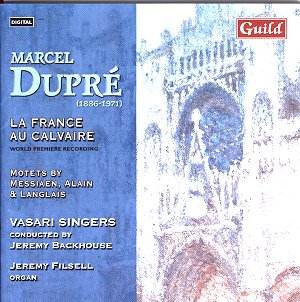The main work obviously on this disc is the Oratorio
by Marcel Dupré "La France au Calvaire"
(France at Calvary), inspired by the destruction suffered in Rouen during
the Second World War (Dupré was born in Rouen); he completed
this in time for the joint celebration of the restoration of Rouen Cathedral
and the 500th anniversary of the official pardon of Joan of Arc in 1956.
The libretto, written by another native of Rouen, the poet René
Herval, is curious; it begins with the allegorical figure of La France
kneeling at the foot of the Cross, begging the dying Christ to forgive
her countrymen their sins. In support of her plea, the six succeeding
movements present a procession of French saints through the ages. The
Finale returns to Calvary where La France repeats her prayer of the
Prologue and is answered by Christ on the Cross. Dupré did not
consider himself a composer, and was first and primarily an organist,
and obviously a very good one - he performed the complete organ works
of J.S.Bach from memory in the early 1920s. He came from a musical family,
and studied at the Paris Conservatoire under Widor. In style he is removed
from the other French modernists, and listening to this work, the impression
I gained was one of César Franck transported into the 20th century.
The work has four soloists, chorus and organ, the latter part being
a tour de force. The soloists are very good, with clear diction and
cope well with demanding roles; the only slight criticism I have is
of the baritone, Colin Campbell, who has a marked vibrato, which is
just short of being intrusive. Catherine Denley is of course well known
and gives her usual sound firm performance, and both the tenor and soprano
leads are held well, both with clear fresh voiced soloists. Jeremy Filsell
at the organ has the job of acting as anchor man and continuo, and performs
this unobtrusively and competently; the organ volume is well adjusted
and does not drown either the soloists or the choir. I am not an organist
and thus cannot comment on the registrations used, but certainly the
effect is very satisfying.
The Vasari Singers are a very competent and justly
respected choir; they were formed in 1980 by a group of friends from
the London Symphony Chorus, and named themselves after Giorgio Vasari
(1511-1575) a musician, architect, artist and critic in sixteenth century
Italy. They thus committed themselves to performing Italian polyphony,
but as their numbers increased their repertoire widened, and they now
embrace a wide spectrum of music. For this programme, from their photograph,
they number 31 and give an excellent account of themselves. They are
virtually semi-professional these days, and their expertise is reflected
in the way in which they cope with Dupré’s score. I cannot say
that I enjoyed the work, rather that it was a most interesting experience
to hear this unusual oratorio; I would not want to listen to it again,
but I’m grateful for the chance of experiencing it. This, together with
the other items on the disc are likely to prove of interest to a student
of modern French choral music. In fact, apart from the Messiaen, none
of these works is otherwise represented in the current catalogue.
Jean Langlais studied at the Institute for Blind
Youth, and later entered the Paris Conservatoire, studying organ under
Dupré. He later took up an appointment at the Sainte Clotilde
church in Paris (previously held by César Franck and Tournemire).
The motet Festival Alleluia is scored for choir and organ, with
optional timpani and trumpets. It consists of contrasting sections singing
for almost 7 minutes to the one word "Alleluia". I found the
whole work tedious because of this, although the singers and organ performed
more than adequately. I am probably missing some finer points, but it
was not for me.
Jéhan Alain was killed in action in 1940,
aged only 29; O Salutaris is a short motet beautifully crafted
and sung. It has been adapted by his sister, the renowned organist Marie-Claire
Alain. It is a very peaceful, easily accessible piece, again well performed,
and which I enjoyed most of any works on this disc.
Olivier Messiaen’s O sacrum convivium is
scored for a capella choir, or soprano and organ; the choral version
is performed here, and again with aplomb by the Vasari singers. I could
not get to grips with this piece, but then Messiaen was ever my bête-noire
and attempts to understand and appreciate his music in the past have
been accompanied by failure!
The recording for all works is up to Guild’s usual
high standards, and reproduction and balance of parts is very natural.
In total a disc for specialists or those liking the unusual in repertoire.
John Portwood


